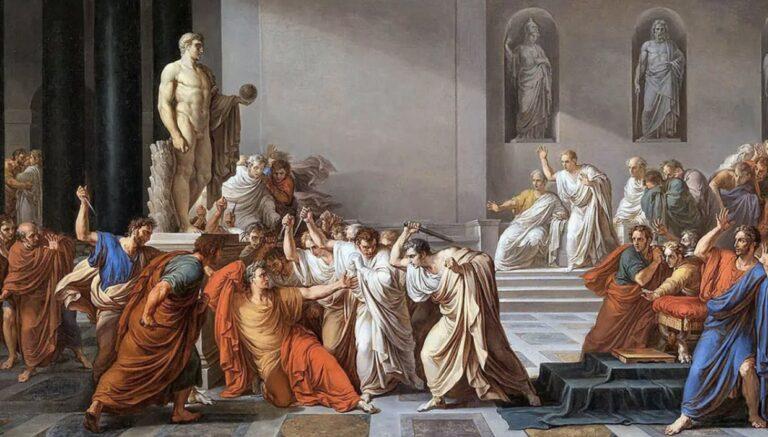69 A.D.: It didn’t take long: one day after entering Rome, the Roman Senate declares Vespian Emperor of the Roman Empire, the fourth one in The Year of Four Emperors.
72 A.D.: Traditional date for the martyrdom of the apostle Thomas, who spent his life after the Resurrection traveling east from the Roman Empire, spending twenty years introducing Christianity to the people of India.
1118: Birth of Thomas Beckett (d.1170), Archbishop of Canterbury.
1620: After five weeks of surveying the shoreline of Cape Cod Bay, the Pilgrims come ashore at Plymouth Rock to begin their first permanent settlement. The group split their time between the building parties ashore and recuperating aboard the Mayflower, with no fewer than 20 men kept always ashore for defensive purposes. The basic work plan was viable, but this first winter in the New World was brutal, with exposure, scurvy and other diseases claiming nearly half of the settlers who survived the treacherous voyage to their new life.
1807: At the request of President Thomas Jefferson, Congress passes the Embargo Act, cutting off all American trade with both Great Britain and France. The act grew out of increasing American exasperation over ship seizures committed by both sides of the renewed Napoleonic wars. Jefferson’s explicit goal was to conduct “economic warfare” with the two European superpowers as punishment for both countries considering American ships and cargoes as contraband of war, rather than neutral trade. Britain, in particular, took not only ships, but American seamen as well, impressing them (i.e., legally kidnapping them) into the chronically under-manned Royal Navy.
The Act did its work to halt American shipping in its tracks, which by extension caused Southern agriculture to rot for lack of European markets, for Northern manufactured goods to gather dust in warehouses, for thousands of ships to be laid up without maintenance, for American companies to go bankrupt, and for a crippling recession to set in across all the States. British and French shippers immediately took up the slack on formerly American trading routes, particularly through the Caribbean and South American markets, and got rich. Black marketeering through Canada became endemic, and widespread disgust at the Federal government’s high-handedness led to massive resistance, particularly from the business interests in New England. The Act was repealed two years later, but by then the damage was done to the credibility of Jefferson’s ideal of limited government versus his doctrinaire big government approach to enforcing a decidedly intellectual solution to the economic depredations of the French and English. Even after repeal, the issues on both sides of the Atlantic continued to fester, leading to yet another embargo attempt in 1812, and eventually, war with England. (Britannica, Wikipedia, History.com)
1808: Ludwig von Beethoven personally conducts the premiers of his 5th and 6th Symphonies, in addition to playing the piano for the premiere of his 4th Piano Concerto and the Choral Fantasy. The concert itself lasted 4 hours.
1809: Birth of legendary frontiersman, trapper, Indian fighter, scout and soldier, Kit Carson (d.1868).
1814: British and American diplomats sign the Treaty of Ghent, formally ending the War of 1812. The terms of the agreement essentially return the belligerents to the status quo ante bellum, which reinforces the notion that this two-year long conflict, never politically popular nor strategically coherent, really was a wasted effort in lost political will, lost commerce, and lives. On the positive side, the US naval victories at sea and the astonishing victory at the Battle of New Orleans convinced Britain that although they need not become close allies with the United States, they now respected us as legitimate power players on the international stage.
1822: Birth of Louis Pasteur (d.1895), whose studies in chemistry and microbiology created the basis for understanding the germ theory of disease, and the principles of vaccination and sterilization of milk and wine to prevent the spread of bacterial infections, a process now known as pasteurization.
1845: New York Morning News journalist John O’Sullivan publishes an editorial advocating for the admission of the Oregon Territory into the United States as the logical result of the country’s manifest destiny to rule the entire continent of North America.
1856: Birth of Frank B. Kellogg (d.1937), U.S. Representative and Senator from Minnesota, and later Secretary of State for Presidents Coolidge and Hoover. He was the namesake negotiator for one of the more esoteric pieces of international diplomacy, the 1928 Kellogg-Briand Pact, which outlaws war as an instrument of national policy, and for which he was awarded the Nobel Peace Prize in 1929. The treaty remains in effect to this day.
1864: Five weeks after taking his leave from the smoldering ruins of Atlanta, Union General William T. Sherman telegraphs President Lincoln with the news of his capture of the port of Savannah, Georgia. “I beg to present to you a Christmas gift the city of Savannah, with one hundred and fifty guns and plenty of ammunition, and also about twenty-five thousand bales of cotton.”
1872: Under the sponsorship and direction of the Royal Society, HMS Challenger sets sail from Portsmouth to begin a three-year, 70,000 mile voyage of science and discovery. Unlike previous expeditions during the great age of discovery in the centuries prior, this expedition was designed around specific oceanographic scientific research that could answer questions about what lay below the depths of the lead line. The effort was staggering. Wikipedia summarized it as: “492 deep sea soundings, 133 bottom dredges, 151 open water trawls and 263 serial water temperature observations were taken. Also about 4,700 new species of marine life were discovered.”
1905: Birth of movie mogul, aircraft designer, pilot, businessman and legendary eccentric, Howard Hughes (d.1976)
1913: President Woodrow Wilson signs into law the Federal Reserve Act, which establishes the Federal Reserve, creating a U.S. Central bank. The “long title” of the law, helpfully included with the Wikipedia entry, reads: “An Act to provide for the establishment of Federal reserve banks, to furnish an elastic currency, to afford means of rediscounting commercial paper, to establish a more effective supervision of banking in the United States, and for other purposes.”
1923: Birth of Vice Admiral James Stockdale (d.2005), one of the Navy’s greats, whose life defined our country’s Vietnam experience. Stockdale was flying one of the two F-8s dueling with North Vietnamese patrol boats during the first Gulf of Tonkin event, and was again overhead when the destroyers USS Maddox & Turner Joy were blazing away at the empty ocean two nights later during an event President Johnson used to justify a massive expansion of the US military engagement in that benighted country.
He was shot down over the North in September of 1965, and was quickly recognized as a uniquely effective leader by both his POW peers and their North Vietnamese captors. The distinction earned him exceptional levels of beatings and torture; his resistance and strength of character under extraordinary duress became a touchstone for all of us in Naval Aviation. Stockdale’s keen intellect and moral integrity allowed him to remain on active duty, despite the lingering physical limitations from his imprisonment, and advanced him to the rank of Vice Admiral and Presidency of the Naval War College. His public life ended on something of a sour note, when Ross Perot asked him to run as Vice President in his Quixotic third party stab during the 1992 election. Never an actual politician, at the first Vice Presidential debate with Al Gore and Dan Quayle, the moderator asked him to introduce himself. Stockdale smiled and said, “Who am I? Why am I here?” using a rhetorical device designed to lead to follow on explanations, but the levity that surrounded those questions, and his verbal fumbles later in the debate, made him appear to be a bumbling old man, instead of the towering intellect and brilliant leader he actually was.
1929: Chairman of the Supreme Soviet, Joseph Stalin, announces “The liquidation of the Kulaks as a class” as a means to bring socialist collective production into the agricultural sector. The Kulaks were independent farmers. With the civil war still festering between the communist Reds and the anti-communist Whites, Stalin took the opportunity to completely consolidate the communist model across the entirety of Russian society, particularly the agricultural heartland. By the end of January, a formal resolution “On measures for the elimination of kulak households in districts of comprehensive collectivization” was issued, and offered local commissars three alternatives for dealing with their restive farmers:
1) Be shot or imprisoned based on the judgment of the commissar;
2) Be sent to prison camps in Siberia after confiscation of all property;
3) Be evicted from their property and used as forced labor at collective farms in their local districts.
Resistance to the order was widespread, particularly in Ukraine, where the events through 1933 are memorialized as the Holodomor, the starvation-induced genocide of over 5,000,000 Ukrainians in the heart of “Russia’s Breadbasket.” Conventional estimates have settled on 14,500,000 deaths nationwide by famine and “judicial” deaths under the order. Stalin himself was un-moved, leaving us with such banal remarks as, “If you want to make an omelet, you have to break a few eggs” and “A single death is a tragedy. A thousand deaths is a statistic.”
1937: Opening night for Walt Disney’s Snow White and the Seven Dwarfs, the world’s first full length animated feature.
1938: In South Africa, discovery and documentation of the first “modern” coelacanth, a fossil fish long believed to be extinct. It wasn’t, and isn’t still. The story of its re-discovery is a terrific fish tale, blending the somewhat obscure disciplines of paleontology and ichthyology.
1939: Finnish soldiers hold off advancing Soviet troops in the Battle of Kelja, part of the Winter War with the Soviet Union. Despite huge pressure and overwhelming odds from the Red Army and air force, Finland was never conquered by the Soviets, eventually ceding only about 10% of its territory at the conclusion of hostilities in 1940.
1943: American General Dwight D. Eisenhower is named Supreme Commander for the Allied invasion of Normandy. Ike’s extraordinary skills in planning and diplomacy with the fractious British and French allies were the key to creating a success from this incredibly complex operation.
1944: A week into the German onslaught through the Ardennes Forest, which created a huge salient splitting the Allied drive toward Germany, the local Wehrmacht commander sends a team under the white flag to dictate surrender terms to the completely surrounded American force defending Bastogne. The American commanding general, Anthony McAuliffe, gave the German delegation a memorable sendoff: after hearing their terms, he looked them in the eye, snarled “Nuts!” and walked away from the astonished Nazis.
1968: Launch of U.S. astronauts Frank Borman, Bill Anders and James Lovell aboard Apollo 8, the first manned mission to leave the gravitational control of the earth. Two and a half hours and three orbits after launch, Borman re-ignites the third stage (S-IVB) of the Saturn V rocket for a flawless Trans-Lunar Injection, beginning the two-and-a-half-day voyage to the Moon.
1968: Two and a half days after their dramatic telecast from lunar orbit, the crew of Apollo 8 makes a perfect re-entry into the earth’s atmosphere, splashing down within two miles of the Pacific Ocean recovery ship, USS Yorktown (CV-10).
1968: Three days after making their trans-lunar injection (TLI) rocket firing, the astronauts of Apollo 8 fire their Service Module’s main engine and enter a stable lunar orbit.
1970: The north tower of the World Trade Center is topped off at 1,368 feet, making it the tallest building in the world.
1983: Pope John Paul II visits in his prison cell the man who was convicted of his attempted murder, Mehmet Ali Agci, and forgives him for shooting him in St. Peter’s Square two years earlier.
1988: A bomb placed aboard a Pan American 747 by Libyan terrorists explodes over Lockerbie, Scotland, killing all 270 souls aboard.
1989: Surrounded by joyously chanting and singing Germans from both sides of the Wall, the Brandenburg Gate re-opens to two-way travel in Berlin, effectively ending the division of East and West Germany.
2001: Why do you have to remove your shoes at the airport TSA stations? Self-identified Islamic jihadist Richard Reed, tries to ignite his explosive-filled shoes on American Airlines Flight 63 over the mid-Atlantic between Paris & Miami. Alert passengers wrestle him to the deck and subdue him. The creep is convicted of eight criminal counts of terrorism, attempted murder and will remain in in the Colorado supermax prison until he dies.




Wow, some silly folks are unhappy because nature is making their version/vision of nature unkempt.
This has got to be the dumbest idea ever proposed! Doubtful it will work in any capacity and it will…
How can this be called workforce housing and not low income housing? Is that term just to keep the Bay…
They are screwing you Rick. I told you when you moved here to be careful who you trust.
In fairness to Rick, it is my opinion the only thing he has done wrong was trust and defend Town…